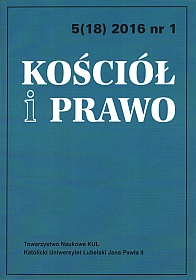Petrine Privilage in Canonical Legal Order
Abstract
The author of this study carried out a thorough analysis of the regulations concerning the instistution of “Petrine Privilage” functioning in the canonical legal order. She has shown that the institution of “Petrine Privilage” is anchored in the papal authority understood in terms of the Vicar of Christ on earth. The marriages entered between Catholics and unbaptized non-Catholics can be dissolved by the power of papal authority. This is possible from the theoretical and legal aspects, because relationships such as this are not sacramental relationships which means that they do not represent absolute inseparability. The procedure in this matter has been defined in the Norms of the Congregation for the Doctrine of the Faith of 2001.
References
Bernárdez Cantón, Alberto. 2006. Compendio de derecho matrimonial canonico. Madrid: Tecnos.
Corral Salvador, Carlos, and José María Urteaga Embil. 2000. Diccionario de Derecho Canonico. Madrid: Tecnos.
Dzierżon, Ginter. 1999. „Sakramentalność małżeństwa ochrzczonych.” Ius Matrimoniale 10:107-124.
Dzierżon, Ginter. 2005. „Privilegium fidei w kanonicznym prawie małżeńskim.” Ius Matrimoniale 10:85-118.
Dzierżon, Ginter. 2011. „Kontrowersje wokół definicji legalnej przywileju zawartej w kan. 76 § 1 Kodeksu Prawa Kanonicznego.” Annales Canonici 7:101-112.
Espín, Orlando O., and James B. Nickoloff. 2007. An Introductory Dictionary of Theology and Religious Studies. Minnesota: A Michael Glazier Book The Liturgical Press.
Gajda, Piotr M. 2000. Prawo małżeńskie Kościoła Katolickiego. Tarnów: Wydawnictwo Diecezji Tarnowskiej Biblos.
Góralski, Wojciech. 1986. „Małżeństwo (kan. 1055-1165).” W Piotr Hemperek, Wojciech Góralski, Franciszek Przytuła, i Józef Bakalarz. 1986. Komentarz do Kodeksu Prawa Kanonicznego z 1983 r. T. 3: Księga III. Nauczycielskie zadanie Kościoła. Księga IV. Uświęcające zadanie Kościoła, 213-357. Lublin: Redakcja Wydawnictw KUL.
Góralski, Wojciech. 2011a. „Małżeństwo w prawie kanonicznym.” Prawo Kanoniczne 54, nr 1-2:127-143.
Góralski, Wojciech. 2011b. Małżeństwo kanoniczne. Warszawa: LexisNexis.
Góralski, Wojciech. 2014. „Wykluczenie bonum sacramenti w opublikowanych wyrokach Trybunału Roty Rzymskiej z 2004 r.” Ius Matrimoniale 25, nr 2:5-30.
Navarrete, Urbano. 1964. “De termino privilegium petrinum non adhibendo.” Periodica 53:322-373.
Navarrete, Urbano. 1978. “Privilegio de la fe: costitutiones pastorales del siglo XVI. Evolución posterior de la práctica de la Iglesiaen la disolución del matrimonio de infieles.” In El vínculo matrimonial “Divorcio o indisolubilidad”, edited by Tomás García Barbarena, 219-238. Madrid: Biblioteca de Autores Cristianos.
Nowakowski, Bartosz. 2013. Rozwiązanie małżeństwa in favorem fidei. Źródła, ewolucja, aktualne normy. Poznań: Prymasowskie Wydawnictwo Gaudentinum.
Principali, Giuseppe. 2000. Il matrimonio rato e non consumato. Da una visione fisicistica ad una personalistico – comunionale dell’atto coniugale. Romae: Libreria de Pontificia Studiorum Universitas in Urbe.
Świaczny, Seweryn. 2004. Nierozerwalność małżeństwa a rozwiązanie małżeństwa naturalnego w prawie kanonicznym. Katowice: Wydawnictwo Uniwersytetu Śląskiego.
Vermeersch, Arthur, and Joseph Creusen. 1954. Epitome Iuris Canonici cum commentariis ad scholas et ad usum privatum. T. 2. Edition 7. Mechliniae–Romae–Parisiis–Bruxellis: Dessain.
Copyright (c) 2016 Kościół i Prawo

This work is licensed under a Creative Commons Attribution-NonCommercial-NoDerivatives 4.0 International License.





